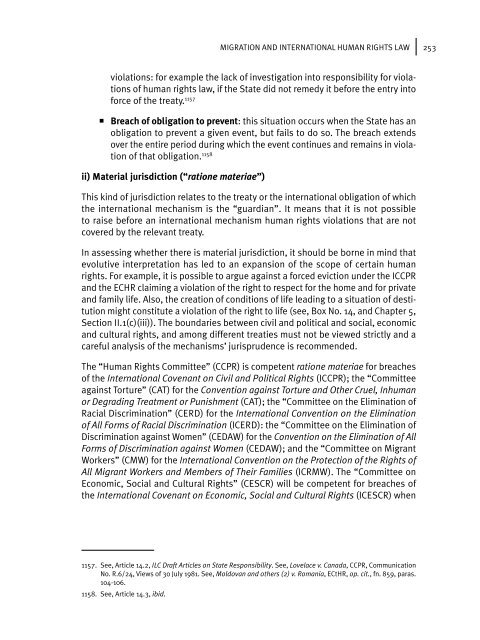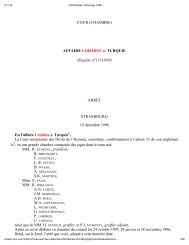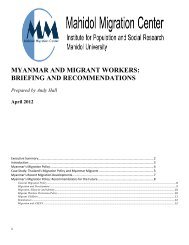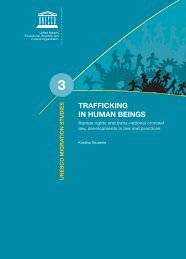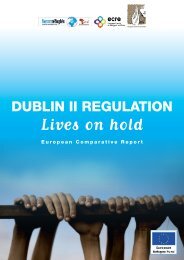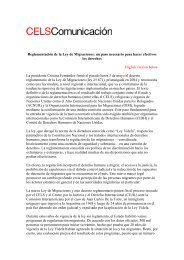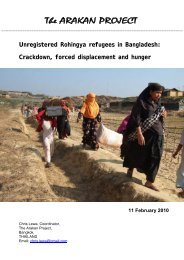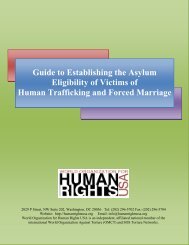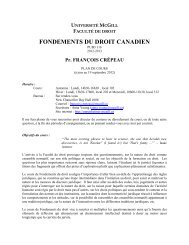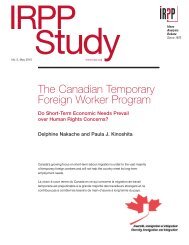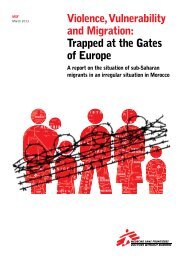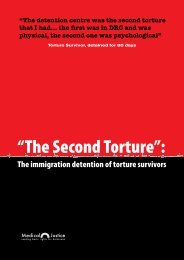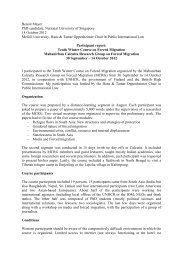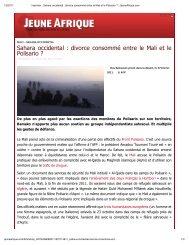- Page 1 and 2:
Migration and InternationalHuman Ri
- Page 3:
International Commission of Jurists
- Page 7 and 8:
Migration and InternationalHuman Ri
- Page 9 and 10:
MIGRATION AND INTERNATIONAL HUMAN R
- Page 11 and 12:
MIGRATION AND INTERNATIONAL HUMAN R
- Page 13 and 14:
MIGRATION AND INTERNATIONAL HUMAN R
- Page 15 and 16:
MIGRATION AND INTERNATIONAL HUMAN R
- Page 17 and 18:
MIGRATION AND INTERNATIONAL HUMAN R
- Page 19:
MIGRATION AND INTERNATIONAL HUMAN R
- Page 22 and 23:
2PRACTITIONERS GUIDE No. 6Internati
- Page 24 and 25:
4PRACTITIONERS GUIDE No. 6Aumeerudd
- Page 26 and 27:
6PRACTITIONERS GUIDE No. 6Zhakhongi
- Page 28 and 29:
8PRACTITIONERS GUIDE No. 6European
- Page 30 and 31:
10PRACTITIONERS GUIDE No. 6C.G. and
- Page 32 and 33:
12PRACTITIONERS GUIDE No. 6Gebremed
- Page 34 and 35:
14PRACTITIONERS GUIDE No. 6Lee v. U
- Page 36 and 37:
16PRACTITIONERS GUIDE No. 6Osman v.
- Page 38 and 39:
18PRACTITIONERS GUIDE No. 6Siliadin
- Page 40 and 41:
20PRACTITIONERS GUIDE No. 6Campbell
- Page 42 and 43:
22PRACTITIONERS GUIDE No. 6Internat
- Page 44 and 45:
24PRACTITIONERS GUIDE No. 6Inter-Am
- Page 46 and 47:
26PRACTITIONERS GUIDE No. 6Modise v
- Page 49 and 50:
MIGRATION AND INTERNATIONAL HUMAN R
- Page 51 and 52:
MIGRATION AND INTERNATIONAL HUMAN R
- Page 53 and 54:
MIGRATION AND INTERNATIONAL HUMAN R
- Page 55 and 56:
MIGRATION AND INTERNATIONAL HUMAN R
- Page 57 and 58:
MIGRATION AND INTERNATIONAL HUMAN R
- Page 59 and 60:
MIGRATION AND INTERNATIONAL HUMAN R
- Page 61 and 62:
MIGRATION AND INTERNATIONAL HUMAN R
- Page 63 and 64:
MIGRATION AND INTERNATIONAL HUMAN R
- Page 65 and 66:
MIGRATION AND INTERNATIONAL HUMAN R
- Page 67 and 68:
MIGRATION AND INTERNATIONAL HUMAN R
- Page 69 and 70:
MIGRATION AND INTERNATIONAL HUMAN R
- Page 71 and 72:
MIGRATION AND INTERNATIONAL HUMAN R
- Page 73 and 74:
MIGRATION AND INTERNATIONAL HUMAN R
- Page 75 and 76:
MIGRATION AND INTERNATIONAL HUMAN R
- Page 77 and 78:
MIGRATION AND INTERNATIONAL HUMAN R
- Page 79 and 80:
MIGRATION AND INTERNATIONAL HUMAN R
- Page 81 and 82:
MIGRATION AND INTERNATIONAL HUMAN R
- Page 83 and 84:
MIGRATION AND INTERNATIONAL HUMAN R
- Page 85 and 86:
MIGRATION AND INTERNATIONAL HUMAN R
- Page 87 and 88:
MIGRATION AND INTERNATIONAL HUMAN R
- Page 89 and 90:
MIGRATION AND INTERNATIONAL HUMAN R
- Page 91 and 92:
MIGRATION AND INTERNATIONAL HUMAN R
- Page 93 and 94:
MIGRATION AND INTERNATIONAL HUMAN R
- Page 95 and 96:
MIGRATION AND INTERNATIONAL HUMAN R
- Page 97 and 98:
MIGRATION AND INTERNATIONAL HUMAN R
- Page 99 and 100:
MIGRATION AND INTERNATIONAL HUMAN R
- Page 101 and 102:
MIGRATION AND INTERNATIONAL HUMAN R
- Page 103 and 104:
MIGRATION AND INTERNATIONAL HUMAN R
- Page 105 and 106:
MIGRATION AND INTERNATIONAL HUMAN R
- Page 107 and 108:
MIGRATION AND INTERNATIONAL HUMAN R
- Page 109 and 110:
MIGRATION AND INTERNATIONAL HUMAN R
- Page 111 and 112:
MIGRATION AND INTERNATIONAL HUMAN R
- Page 113 and 114:
MIGRATION AND INTERNATIONAL HUMAN R
- Page 115 and 116:
MIGRATION AND INTERNATIONAL HUMAN R
- Page 117 and 118:
MIGRATION AND INTERNATIONAL HUMAN R
- Page 119 and 120:
MIGRATION AND INTERNATIONAL HUMAN R
- Page 121 and 122:
MIGRATION AND INTERNATIONAL HUMAN R
- Page 123 and 124:
MIGRATION AND INTERNATIONAL HUMAN R
- Page 125 and 126:
MIGRATION AND INTERNATIONAL HUMAN R
- Page 127 and 128:
MIGRATION AND INTERNATIONAL HUMAN R
- Page 129 and 130:
MIGRATION AND INTERNATIONAL HUMAN R
- Page 131 and 132:
MIGRATION AND INTERNATIONAL HUMAN R
- Page 133 and 134:
MIGRATION AND INTERNATIONAL HUMAN R
- Page 135 and 136:
MIGRATION AND INTERNATIONAL HUMAN R
- Page 137 and 138:
MIGRATION AND INTERNATIONAL HUMAN R
- Page 139 and 140:
MIGRATION AND INTERNATIONAL HUMAN R
- Page 141 and 142:
MIGRATION AND INTERNATIONAL HUMAN R
- Page 143 and 144:
MIGRATION AND INTERNATIONAL HUMAN R
- Page 145:
MIGRATION AND INTERNATIONAL HUMAN R
- Page 148 and 149:
128PRACTITIONERS GUIDE No. 6As note
- Page 150 and 151:
130PRACTITIONERS GUIDE No. 6and sta
- Page 152 and 153:
132PRACTITIONERS GUIDE No. 6allowed
- Page 154 and 155:
134PRACTITIONERS GUIDE No. 6in the
- Page 156 and 157:
136PRACTITIONERS GUIDE No. 69.1 ACH
- Page 158 and 159:
138PRACTITIONERS GUIDE No. 6refers
- Page 160 and 161:
140PRACTITIONERS GUIDE No. 6issue m
- Page 162 and 163:
142PRACTITIONERS GUIDE No. 6• rea
- Page 164 and 165:
144PRACTITIONERS GUIDE No. 6rights
- Page 166 and 167:
146PRACTITIONERS GUIDE No. 6can be
- Page 168 and 169:
148PRACTITIONERS GUIDE No. 6into ac
- Page 170 and 171:
150PRACTITIONERS GUIDE No. 6procedu
- Page 172 and 173:
152PRACTITIONERS GUIDE No. 63. Dete
- Page 174 and 175:
154PRACTITIONERS GUIDE No. 6release
- Page 176 and 177:
156PRACTITIONERS GUIDE No. 6their c
- Page 178 and 179:
158PRACTITIONERS GUIDE No. 6Court,
- Page 180 and 181:
160PRACTITIONERS GUIDE No. 6violati
- Page 182 and 183:
162PRACTITIONERS GUIDE No. 6• det
- Page 184 and 185:
164PRACTITIONERS GUIDE No. 6violati
- Page 186 and 187:
166PRACTITIONERS GUIDE No. 6recomme
- Page 188 and 189:
168PRACTITIONERS GUIDE No. 6Belgium
- Page 190 and 191:
170PRACTITIONERS GUIDE No. 6act ran
- Page 192 and 193:
172PRACTITIONERS GUIDE No. 6primary
- Page 194 and 195:
174PRACTITIONERS GUIDE No. 6the Rig
- Page 196 and 197:
176PRACTITIONERS GUIDE No. 6to requ
- Page 198 and 199:
178PRACTITIONERS GUIDE No. 6remains
- Page 200 and 201:
180PRACTITIONERS GUIDE No. 6however
- Page 202 and 203:
182PRACTITIONERS GUIDE No. 6sentati
- Page 204 and 205:
184PRACTITIONERS GUIDE No. 6or Impr
- Page 206 and 207:
186PRACTITIONERS GUIDE No. 6detaine
- Page 208 and 209:
188PRACTITIONERS GUIDE No. 6arrest
- Page 211 and 212:
MIGRATION AND INTERNATIONAL HUMAN R
- Page 213 and 214:
MIGRATION AND INTERNATIONAL HUMAN R
- Page 215 and 216:
MIGRATION AND INTERNATIONAL HUMAN R
- Page 217 and 218:
MIGRATION AND INTERNATIONAL HUMAN R
- Page 219 and 220:
MIGRATION AND INTERNATIONAL HUMAN R
- Page 221 and 222: MIGRATION AND INTERNATIONAL HUMAN R
- Page 223 and 224: MIGRATION AND INTERNATIONAL HUMAN R
- Page 225 and 226: MIGRATION AND INTERNATIONAL HUMAN R
- Page 227 and 228: MIGRATION AND INTERNATIONAL HUMAN R
- Page 229 and 230: MIGRATION AND INTERNATIONAL HUMAN R
- Page 231 and 232: MIGRATION AND INTERNATIONAL HUMAN R
- Page 233 and 234: MIGRATION AND INTERNATIONAL HUMAN R
- Page 235 and 236: MIGRATION AND INTERNATIONAL HUMAN R
- Page 237 and 238: MIGRATION AND INTERNATIONAL HUMAN R
- Page 239 and 240: MIGRATION AND INTERNATIONAL HUMAN R
- Page 241: MIGRATION AND INTERNATIONAL HUMAN R
- Page 244 and 245: 224PRACTITIONERS GUIDE No. 6II. The
- Page 246 and 247: 226PRACTITIONERS GUIDE No. 6status
- Page 248 and 249: 228PRACTITIONERS GUIDE No. 6remarke
- Page 250 and 251: 230PRACTITIONERS GUIDE No. 6UN Comm
- Page 252 and 253: 232PRACTITIONERS GUIDE No. 6for exa
- Page 254 and 255: 234PRACTITIONERS GUIDE No. 6These r
- Page 256 and 257: 236PRACTITIONERS GUIDE No. 6shall t
- Page 258 and 259: 238PRACTITIONERS GUIDE No. 6of Expe
- Page 260 and 261: 240PRACTITIONERS GUIDE No. 6regulat
- Page 262 and 263: 242PRACTITIONERS GUIDE No. 6b) The
- Page 264 and 265: 244PRACTITIONERS GUIDE No. 6dence i
- Page 266 and 267: 246PRACTITIONERS GUIDE No. 6program
- Page 268 and 269: 248PRACTITIONERS GUIDE No. 6the con
- Page 270 and 271: 250PRACTITIONERS GUIDE No. 6f) Time
- Page 274 and 275: 254PRACTITIONERS GUIDE No. 6the Opt
- Page 276 and 277: 256PRACTITIONERS GUIDE No. 6For exa
- Page 278 and 279: 258PRACTITIONERS GUIDE No. 6being a
- Page 280 and 281: 260PRACTITIONERS GUIDE No. 6• Rep
- Page 282 and 283: 262PRACTITIONERS GUIDE No. 6it is t
- Page 284 and 285: 264PRACTITIONERS GUIDE No. 6also ar
- Page 286 and 287: 266PRACTITIONERS GUIDE No. 6applica
- Page 288 and 289: 268PRACTITIONERS GUIDE No. 6the Cou
- Page 290 and 291: 270PRACTITIONERS GUIDE No. 6The bin
- Page 292 and 293: 272PRACTITIONERS GUIDE No. 6about t
- Page 294 and 295: 274PRACTITIONERS GUIDE No. 6and the
- Page 296 and 297: 276PRACTITIONERS GUIDE No. 6Decisio
- Page 298 and 299: 278PRACTITIONERS GUIDE No. 6motion,
- Page 300 and 301: 280PRACTITIONERS GUIDE No. 6a) Lega
- Page 302 and 303: 282PRACTITIONERS GUIDE No. 6the pet
- Page 304 and 305: 284PRACTITIONERS GUIDE No. 6Rights
- Page 306 and 307: 286PRACTITIONERS GUIDE No. 6Admissi
- Page 308 and 309: 288PRACTITIONERS GUIDE No. 6Judgmen
- Page 310 and 311: 290PRACTITIONERS GUIDE No. 6The Int
- Page 312 and 313: 292PRACTITIONERS GUIDE No. 6Special
- Page 314 and 315: 294PRACTITIONERS GUIDE No. 6Follow-
- Page 316 and 317: 296PRACTITIONERS GUIDE No. 6than me
- Page 318: 298PRACTITIONERS GUIDE No. 6cases i


